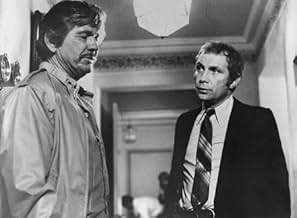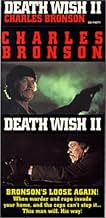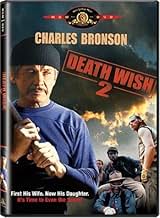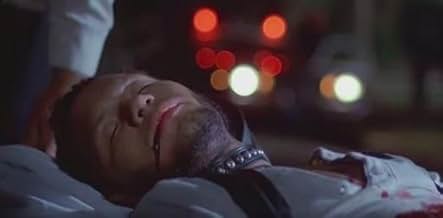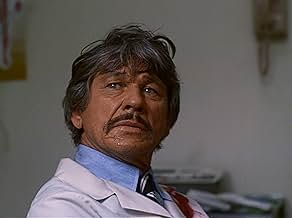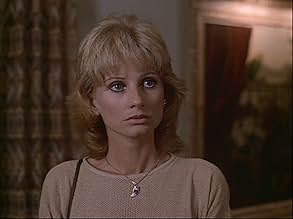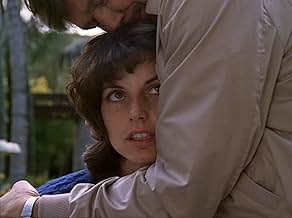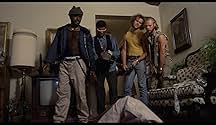El arquitecto Paul Kersey una vez más se convierte en un justiciero cuando intenta encontrar a los cinco punks callejeros que asesinaron a su hija y a su ama de llaves, esta vez en las oscur... Leer todoEl arquitecto Paul Kersey una vez más se convierte en un justiciero cuando intenta encontrar a los cinco punks callejeros que asesinaron a su hija y a su ama de llaves, esta vez en las oscuras calles de Los Ángeles.El arquitecto Paul Kersey una vez más se convierte en un justiciero cuando intenta encontrar a los cinco punks callejeros que asesinaron a su hija y a su ama de llaves, esta vez en las oscuras calles de Los Ángeles.
- Dirección
- Guionistas
- Elenco
- Premios
- 2 nominaciones en total
- Nirvana
- (as Thomas Duffy)
- Cutter
- (as Laurence Fishburne III)
- Dirección
- Guionistas
- Todo el elenco y el equipo
- Producción, taquilla y más en IMDbPro
Opiniones destacadas
None of Paul Kersey's (Charles Bronson) remaining family and friends get off lightly in this twisted nightmare of domestic violence, anal rape, vigilante justice and simplistic politics.
For fans of rough justice, the rape of Bronson's Mexican housemaid is truly amazing and eroticized like crazy by Winner's leering direction.
Thomas F. Duffy as Nirvana, the film's lead thug, is really horrible and a joy to behold (in a perverse way).
Led Zeppelin's Jimmy Page provides a rock score that scorches the L.A. imagery and Vincent Gardenia returns as the cop who prefers to look the other way.
A Cannon-backed sleazefest that brings home the groceries if you like eating trash.
Screw GONE WITH THE WIND. This is much more entertaining.
After watching the original Death wish movie I was a little un sure if I wanted to watch any of the sequels.
Mostly because while I liked the 1st movie I thought it was still pretty standard compared to other crime movies at the time like Dirty Harry.
Thankfully though the sequel Death Wish 2 blew everything out of the park.
Everything I felt that was lacking in the 1st movie was improved on and expanded in the sequel.
For example in the 1st movie the muggers kill Paul Kersey's wife and attack his daughter. You would think Paul would go after the muggers when he takes up being a vigilante but no he kills random muggers on the street which while more realistic feels a lot less satisfying.
In the second one not only does he go after the muggers that killed his loved one but he also does so in creative ways. In fact all the shoot em up scenes in the movie are far better in this movie.
The climax also a 100 times better as well and more personal.
There's also a nice romance in the movie with the love interest played by Charles Bronson's real life wife Jill Ireland. Its very fulfilling.
In fact that's the best way to describe Death Wish 2. Its very fulfilling.
Everything from the 1st movie that was lacking is back and improved upon making for a very fun and fulfilling action movie.
The first peculiarity is that much more strongly than the first film, Death Wish II's urban crime-ridden backdrop is exaggerated to a point of caricature. Of course, there was plenty of crime in Los Angeles during this era, but not as depicted here. This is almost Broadway-style crime, with choreographed gaggles of hoodlums running out of control in designer gang-wear, making spectacles of themselves. It's over the top but serious in a way that feels uncomfortable at first, but then, that's just the point, and it helps anchor the plot developments that follow.
And that plot should be no surprise to anyone who first watches Death Wish I. Death Wish II follows the plot of its predecessor as if it were a fairly rigid template. Even the events that cause Paul Kersey (Charles Bronson) to take charge and clean up society's scum by his lonesome are very similar. I don't see this as a flaw here (as I don't in many other sequels that use a template approach, including series like Friday the 13th). This is a direct continuation of the story of the first film, and the similarity gives Death Wish II both a natural, logical flow and a nice symmetrical structure.
Although Death Wish I had its brutal moments, Death Wish II amplifies that atmosphere and sustains it through its length. Like the films that best display gritty 1970s New York City--such as Taxi Driver (1976) and Basket Case (1982)--Death Wish II makes you feel almost dirty (in the grimy despair way, not a sexual way) while watching it. It's ironic, maybe, that Death Wish II does this so well when the setting is Los Angeles as opposed to actually being New York City, as in the first film. That director Michael Winner is able to perpetuate that atmosphere, whether by accident or design, results in the viewer being sucked into the setting and vicariously experiencing the range of unpleasant emotions felt by both the protagonists and the antagonists.
Also helping on that end is the score, provided by Led Zeppelin guitarist Jimmy Page. Although Winner sometimes incorporates Page's music in a discordant, jarring way--over the opening credits when it fights for volume with radio banter, for example--more often than not the score gives Death Wish II a sublime, otherworldly and eerie edge. It's too bad that Page didn't go on to score many more films.
This is certainly not a film to show during family time, and it's not particularly uplifting or overflowing with positive messages or socially redeeming values. But it's not trying to be any of those things. It's just a visceral (especially on an emotional level), disturbing revenge flick, and at that, it meets its goals well.
Yet therein lies the purpose of such rough-edged, unpleasant entertainment. It sparks the id, pummels it into submission, so that when the experience is over, a sigh of relief is uttered.
The original "Death Wish" was a well-done exploitation flick with the professional gloss of an A picture; despite its relatively shallow insight into the murky moral terrain of vigilante justice, it contained an intensely subdued performance by Charles Bronson, and confident direction by Michael Winner.
By comparison, "Death Wish 2" is a typical sequel, taking what the original had and dumbing it down to milk some cash for the franchise. In addition to Bronson (in the role of architect Paul Kersey), a few other characters return to provide at least a superficial connection to the original (Robin Sherwood as his daughter; Vincent Gardenia as the cop that uncovered his identity). The plot is as before: Paul Kersey has begun a new life (courting the cheerfully cardboard Jill Ireland) which is shattered when a gang of punks (including a young Laurence Fishburne) rape and murder his housekeeper and daughter. Unlike the original, no time is spent watching Kersey contemplate his actions; he simply goes to work, and in the process is rendered a stoic killing machine. The characterization/motivation for the punks is given even less thought--they exist for the sole purpose of showing how scummy the scummiest scum of society can be. The film moves from one random encounter to the next, wherein Kersey stumbles across gang members and kills them.
Of course this doesn't sound like highbrow film-making, but "Death Wish 2" never teases the audience with any notions of greatness. In spite of the meager attention given to Kersey's character, we root for him anyway; and in spite of the inexplicably-written punks, we hope for their demise. Michael Winner once again gives the film a gritty yet polished look, though he is clearly directing a flat-out B picture; the pacing is tight (the film runs just under 90 minutes), and the action is competently choreographed (though the romantic subplot provides a respite from the relentless violence, it is shallow and cloying). Jimmy Page's offbeat musical score only adds to the unusual charge this film packs.
In the best-case scenario, "Death Wish 2" is no masterpiece, but the perfect Novocaine to apply after a particularly rotten day. It will numb you into a state of apathy and wash your troubles away (that's a compliment).
¿Sabías que…?
- TriviaAccording to Michael Winner's biography, Charles Bronson's alcoholic brother often visited the set to borrow money. Bronson was careful not to give him too much in case someone might kill him for it. He was later found dead in a cheap hotel room having been stabbed in the buttocks.
- ErroresKay tells Kersey he will wait three minutes before ringing the security alarm, yet he only waits about a minute or less.
- Citas
Paul Kersey: You believe in Jesus?
Stomper: Yes, I do.
Paul Kersey: Well, you're gonna meet him.
[Paul shoots Stomper dead]
- Versiones alternativasThe R-rated US release is heavily edited missing part of the rape scene of the maid and most of the rape scene of Kersey's daughter (and her graphic suicide). The uncut version is available on BluRay.
- ConexionesFeatured in Not for Women Only: Episode dated 15 February 1982 (1982)
- Bandas sonorasGo, Tell It on the Mountain
Traditional
Performed by the church congregation
Selecciones populares
Detalles
- Fecha de lanzamiento
- País de origen
- Idiomas
- También se conoce como
- Death Wish II
- Locaciones de filmación
- 1716 North Western Avenue, Los Ángeles, California, Estados Unidos(Pioneer Chicken where Paul Kersey stares at the punks)
- Productoras
- Ver más créditos de la compañía en IMDbPro
Taquilla
- Presupuesto
- USD 2,000,000 (estimado)
- Total en EE. UU. y Canadá
- USD 16,100,000
- Total a nivel mundial
- USD 16,100,000
Contribuir a esta página






